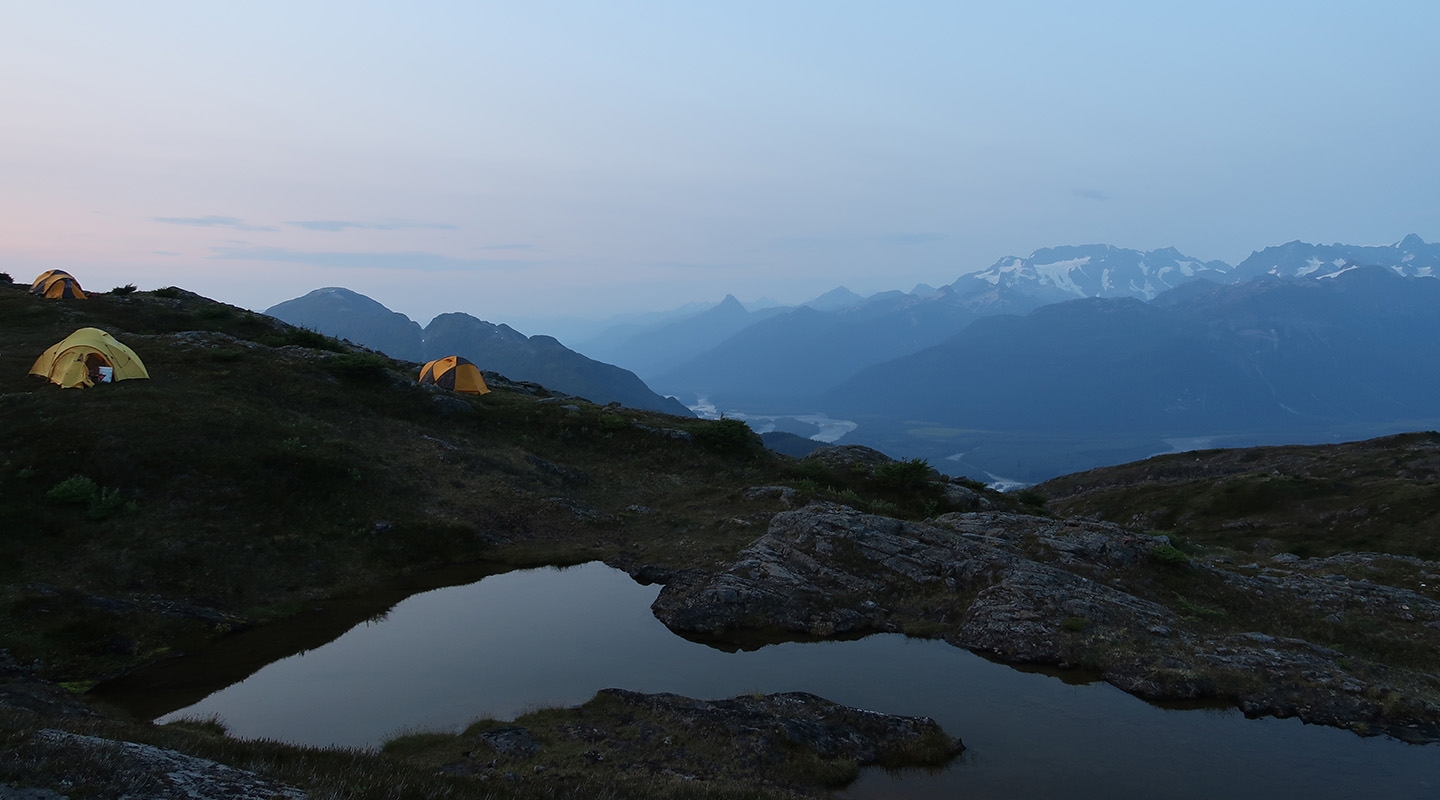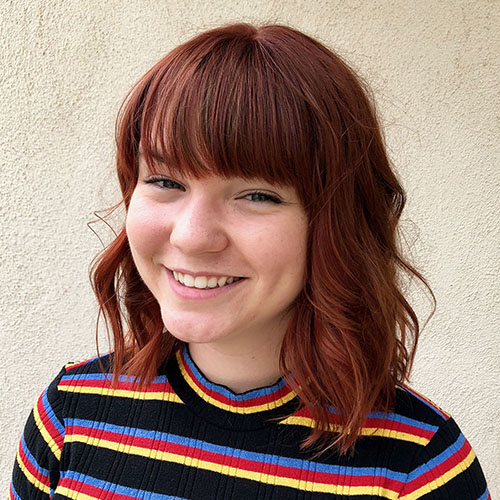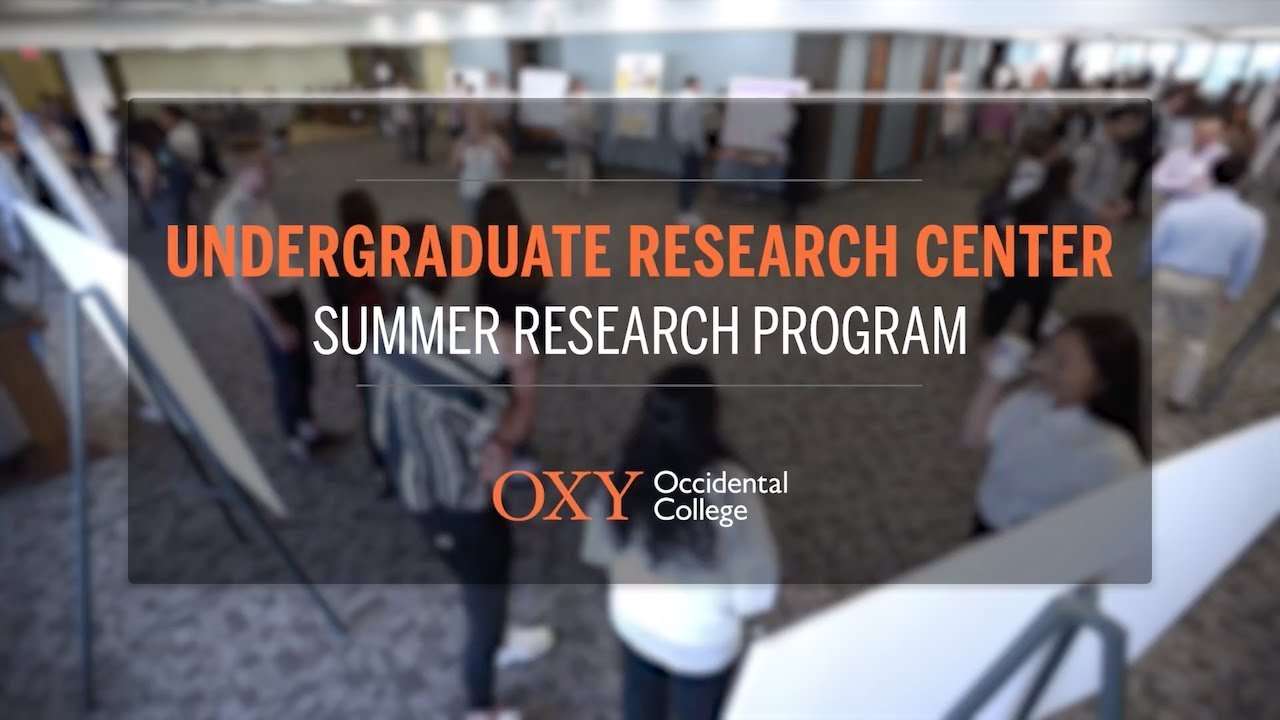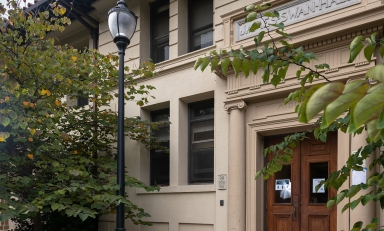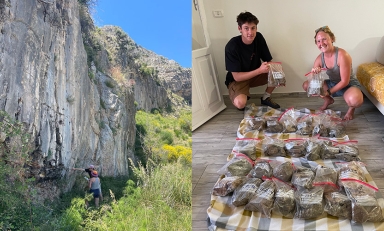Across departments at Occidental, students benefit from the collaborative process of discovery with their faculty mentors.
Main image: field work site for Occidental geology researchers in the Stikine River area of British Columbia, Canada.
It’s fairly unusual for undergraduate students to work directly with experts in their fields to conduct research, but at Oxy, you can see it across departments and disciplines. One of the biggest advantages of a small liberal arts college is the close professional relationship students can develop with faculty, often leading to opportunities for academic collaboration.
At Oxy, undergraduate reseach is considered a signature program, one which has received national recognition. Going beyond the lessons they learn in the classroom, students develop an ability to negotiate complex problems and dynamics—as well as the values of persistence, perseverance and collaboration.
Andrew Shtulman, professor of cognitive science and psychology, runs the Thinking Lab and is also the chair of the College’s Undergraduate Research Center, which supports approximately 350 students annually to pursue projects in all disciplines. Shtulman’s Early Career Development Award from the National Science Foundation plus another grant have amounted to 11 years of funding for student research, which covers stipends for work hours, housing, travel or conference attendance. He typically works with 10 students each year.
At major research universities, Shtulman points out, undergraduate researchers typically work with graduate students rather than faculty, which means less expertise and familiarity with the literature of the field. This stands in contrast to Oxy, where close faculty mentorship is a key part of the experience.
“Our faculty give so much to their undergraduate researchers,” says Margi Rusmore, Gibby Professor of Science in geology. “Because our job is focused solely on development of undergrads, our students get a high level of attention and development.”
Seva Rodnyansky, assistant professor of urban & environmental policy, is working on a large study with USC and UC Davis that looks at the effects of population migration from the Bay Area to California’s Central Valley. Rodnyansky hired two students to work with him this year, juniors Jada Ho and Emilio Pardi.
“Oxy already has a great faculty-to-student ratio, but this kind of collaboration is even more close knit,” Rodnyansky says. “It’s one-on-one or one-on-two at a time.”
Researching demographics, transportation patterns and municipal finance, the students have been learning very quickly, doing everything from getting respondents for surveys to analyzing big data on fiscal health to understanding movements using the Census. They have also been presenting their work to senior members of the multicampus project.
“I really enjoy seeing the rapid pace of development,” Rodnyansky says.
Research isn’t just for the graduate school-bound
Though having experience in academic research certainly gives students a leg up on the competition when applying for graduate school, particularly in STEM fields, being involved in research can be profoundly beneficial regardless of your field or future plans. The experience enhances your college education in ways both direct and indirect.
“I think experimentalism is at the heart of the sciences and humanities,” says Mariška Bolyanatz Brown, an assistant professor of Spanish and French studies whose focus is linguistics. “You’re asking and trying to answer questions. This is at the core of everything we’re trying to do in college—develop a sense of inquiry or an interest in something and then get deeper and see what’s behind it.”
Rusmore echoes this sentiment. “What I hope that undergrad research awakens in all people—whatever their field—is the love of discovery, because it’s a pretty cool thing. Discovery is one of the most important things humankind can do.”
Bolyanatz Brown says she wants to make research accessible to anyone. “It doesn’t have to be this huge dissertation-sized project—you just have to have a question that you want to answer or know more about through evidence.”
In addition to hard skills and methodologies learned through research, students also develop important soft skills that are critical now and in the future.
“Learning research is also learning how to communicate in the outside world and employ a real-world mentality—things like project management, deadlines and budget management that you’re not necessarily getting in class,” Rodnyansky says.
Ilana Share ’17 majored in psychology at Oxy and worked with Shtulman on three different undergrad research projects, one of which led to a publication: “OMG GMO! Parent-child conversations about genetically modified foods.” She was listed as a co-author with Shtulman and Rosie Silber-Marker ’17, and as seniors the students presented their research at the 2017 meeting of the Society for Research in Child Development.
Today Share works in the Bay Area as a benefits consultant at Gallagher, a global insurance firm. While her current role doesn’t involve empirical research, she says her research experiences taught her transferable skills.
“I strengthened my perseverance, learned how to analyze large data sets and pull out the most meaningful takeaways, and enhanced my public speaking skills. Although my career has gone down a different path, it was an honor to be published.”
Meaningful collaboration that is mutually beneficial
Faculty are quick to point out that collaborations with students keep them on their toes, compel them to think in new ways with cross-disciplinary perspectives and make them smarter. Students bring energy, inquisitiveness, enthusiasm and a fresh perspective to a project. Sometimes student involvement even guides faculty research.
“A lot of my published papers with student authors are projects that I would not have done on my own,” Shtulman says. “Maybe I was thinking about doing something in that area, but the final shape of the project has come about through the collaboration with students.”
Associate Professor of Philosophy Clair Morrissey was recently invited to write chapters for two anthologies, and she was committed to working with undergraduates as co-authors. “I’m always keeping my eye out for students in my classes whose skills are really developing, someone I think I can push by giving them a project like this,” she says.
One of her collaborations was with philosophy and psychology double major Elena Neale ’20. They wrote a chapter about preimplantation genetic technologies related to IVF, a topic that Neale was specifically interested in, so she was given primary responsibility for doing the related psychology literature review.
Neale, who will begin her master’s in mental health counseling in January, saw it as an amazing opportunity to create something meaningful while learning from her professor. “In class, our papers are only read by our professors, but this project could actually inspire change in its readers, a wider audience,” she says. “That alone was enough to make me more passionate than I would be for a class assignment.”
Morrissey and Neale met weekly, discussed the literature, worked through their shared ideas and started to write. “By the end, we both really had ownership over every word that was in the paper, which was really important to me,” Morrissey says.
In addition to being inspiring and “frankly, quite fun,” the project also helped Neale gain confidence as a scholar. “As a student, it was initially quite shocking to be regarded as a research colleague,” she says, “but as I saw my ideas and contributions meaningfully shape our project I was able to take myself more seriously as well.”
Associate Professor Julie Prebel, director of Oxy’s Writing Center, recently mentored history major Bethany Widen ’21 through the process of submitting an article to a scholarly journal. As an opportunity for professional development, Prebel encouraged her student writing advisers, including Widen, to consider working on a publication in the field of writing center studies.
“Many students may not go on to write for scholarly journals, but when they write to be read by many people (as was the case with Bethany) they learn to understand the greater rhetorical significance of their work,” Prebel says.
Widen’s three years of working with Prebel at the Center led to a co-authorship opportunity in which Widen was first author on a publication in one of the most widely read academic blogs in writing center scholarship. In the era of COVID-19, she says, “this article was an opportunity to share how creative problem solving resulted in our recommitment to creating a collaborative space for advisers and students.”
The process was very collaborative, with lots of meetings, brainstorming and reading the existing research. Each worked on different parts of the article, and during the editing process they made changes together line by line. “[Professor Prebel] partnered with me as both mentor and colleague,” Widen explains.
Learning while doing
Undergraduate research exposes students to a field and shows them what academic research entails. Pushing the skills they’ve learned in class to another level, they refine writing, editing and communication abilities. They learn about everything that goes into working with data, from collection to pilot testing to coding, analyzing and determining what the data actually shows.
Some students are looking for a more applied way of working and learning relative to what they get in class, and research serves as a narrower but deeper sandbox. Matt Aleksey ’21 is a geology major and Science Scholar who has worked on a number of research projects in the department. He wants to pursue a Ph.D. after graduation. “I love working with my hands, which is something that really appeals to me about geology,” he says.
As a sophomore, Aleksey approached Rusmore to inquire about research opportunities. In his subsequent work with her, he has analyzed the history of magmatism through geochronologic analysis in the Coast Mountains of British Columbia, done field work in the San Gabriel and Sierra Mountains, and processed 40-pound chunks of rock into sand with a “rock crusher” to sift out minerals for dating.
“When you’re taking classes, it’s ‘This is what we know, memorize this, know this,’” he says. “But when you’re doing research, the true science kicks in. Now it’s ‘OK, you got this data, so what does it mean?’”
In October, Aleksey presented his research virtually at the Geological Society of America conference. Although he had some trepidation, he felt he managed all of the questions well and came out feeling really good.
“One of the great things about undergrad research is that it’s a place where you can develop yourself and navigate the difficulties of research with much more individualized attention,” Rusmore says. “It’s a chance to develop your capacity and the confidence that you can do it before you get to grad school, where the stakes are higher.”
Although Aleksey admits he had been “incredibly nervous” to ask about research opportunities, he advises students to just talk to their professors, see what they think and what advice they might have.
“When you’re starting out, view it primarily as a learning experience,” he says. “At the beginning, it was more important that I figured out how to do research than to get the results I was looking for.”
Learn more about the Undergraduate Research Center at Occidental:

